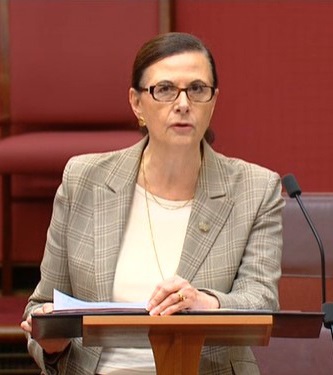The Australian Alert Service is the weekly publication of the Australian Citizens Party.
It will keep you updated on strategic events both in Australia, and worldwide, as well as the organising activities of the Citizens Party.
To subscribe to the Australian Alert Service, it's easy, and it's secure.
Lead Editorial
30 March 2022
Vol. 24 No. 13
Treasurer Josh Frydenberg has handed down a cost-ofliving budget in a desperate attempt to save the Morrison government, but it’s too little too late. Scott Morrison himself has become the biggest cost burdening Australians and there’s only one solution: “He. Can. Go!”
Facing defeat, Morrison’s own colleagues are dropping their masks and turning on him, confirming his true character which drives his appalling politics, including: his slavish devotion to the banks that prey on ordinary Australians; his vindictiveness as seen with Christine Holgate that has thrown Australia Post and its small business licensed post offices into chaos; and his sycophancy to US and UK neoconservatives that has lurched Australia towards a dangerous conflict with China. Like Samson pulling down the temple on his enemies, outgoing Liberal Senator Concetta Fierravanti-Wells dropped a bomb on Scott Morrison late in the evening after the budget speech, taking aim at Morrison and his political henchman, Immigration Minister Alex Hawke:
“There is a very appropriate saying here: the fish stinks from the head”, Senator Fierravanti-Wells declared. “Morrison and Hawke have ruined the Liberal Party in New South Wales by trampling its constitution. … In recent months I have kept members of the division updated. I have received hundreds, if not thousands, of emails outlining their disgust. They have lost faith in the party. They want to leave. They don’t like Morrison and they don’t trust him. They continue to despair at our prospects at the next federal election, and they blame Morrison for this. Our members do not want to help in the upcoming election.”
The Senator was only getting started. She then turned Morrison’s foreign policy propaganda-speak against him, including his recent dribble about democracies vs. autocracies: “By now you might be getting the picture that Morrison is not interested in rules-based order”, she said. “It is his way or the highway—an autocrat and a bully who has no moral compass.”
Fierravanti-Wells concluded: “In my public life I have met ruthless people. Morrison tops the list... Morrison is not fit to be Prime Minister”.
Senator Fierravanti-Wells only said all this because she is on her way out (as usual); sadly, the disturbing truths she has confirmed leave a legacy Australians have to live with, and it is showing up in the cost of living. To address the crisis, we need a new system, not bandaids. The way to understand Morrison and his almost-as-bad predecessors is that they were the last guardians of neoliberalism, meaning, in practice, the power of the banks over the economy. That power should have been overthrown after the 2008 global financial crisis, when the entire neoliberal system was exposed as a fraud, but the banks used their corrupt stooges in governments to protect their interests, through policies including quantitative easing (QE) money printing and “bail-in”. (p. 13)
What should have been done, which would have made the economy functional and averted the cost-of-living crisis, is the establishment of a new system centred on public banks, like the Citizens Party’s proposed postal bank and national banking system. These banks would have stabilised the financial system, by giving people a safe haven for their savings, and recapitalised the economy by investing those savings in long-term, productivity-enhancing infrastructure and the industries that create jobs. Using the postal bank etc. to invest in infrastructure frees up the national budget to pay for expanded services, especially in priority areas like health and aged care. Governments fulfilling their responsibility to provide services to the public, instead of outsourcing those services to private corporations for profit, keeps costs low. The infrastructure itself lowers living costs by making power, transportation, and other necessities more efficient and cheaper.
These solutions were once second nature to governments, as in the post-WWII boom, but they have been corruptly suppressed for four decades. With our opponents imploding, we can win our fight to bring them back.
In this issue:
- Morrison’s Hells Gate Dam is half-baked
- Local governments struggle to fund essential services
- Australia’s battle for natural disaster insurance
- Australian Government Insurance Corporation
- Canberra’s hysteria over imaginary Chinese naval bases
- Danger of nuclear war is the greatest since 1962
- Anti-Russia sanctions have earth-shaking backfire potential
- UK review: the new regulatory sheriff in town is ‘bail-in’
- Compensate Sterling victims now!
- Cairns: We should have borrowed from RBA not overseas
- ALMANAC: How Biden’s sanctions against Russia hurt US and European space programs
Click here for the archive of previous issues of the Australian Alert Service








